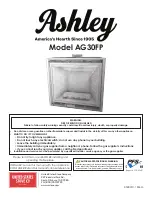
2200 Insert Installation and Operation Manual
______________________________________________________________________________ 19
4.4
BLOWER OPERATION
Allow the insert to reach operating temperature (approximately one hour), before turning on the
blower, since increased airflow from the blower will remove heat and affect the start-up
combustion efficiency.
NOTE: ENSURE THE BLOWER CORD IS NOT IN CONTACT WITH ANY SURFACE OF THE INSERT TO
PREVENT ELECTRICAL SHOCK OR FIRE DAMAGE. DO NOT RUN CORD BENEATH THE INSERT.
Your insert’s blower is equipped with a heat sensor. Therefore, you can leave the speed control at
the desired setting. The blower will start automatically when the insert is hot and it will stop when
the insert has cooled down.
4.4.1
BUILDING DIFFERENT FIRES FOR DIFFERENT NEEDS
Using the air control is not the only way to match the insert’s heat output to the heat demand.
Your house will need far less heat in October than in January to be kept at a comfortable
temperature. If you fill the firebox full in fall weather, you will either overheat the space or turn
the insert down so much that the fire will be smoky and inefficient. Here are some suggestions for
building fires to match different heat demand.
4.4.1.1
Small Fires to Take the Chill Off the House
To build a small fire that will produce a low heat output, use small pieces of firewood and load
them crisscross in the firebox. The pieces should be only 3” to 4” in diameter. After raking the
coals, you can lay two pieces parallel to each other corner to corner in the firebox and lay two
more across them in the other direction. Open the air control fully and only reduce the air after
the wood is fully flaming. This kind of fire is good for mild weather when you are around to tend
the insert and should provide enough heat for four hours or more. Small fires like this are a good
time to use softer wood species so there will be less chance of overheating the house.
















































